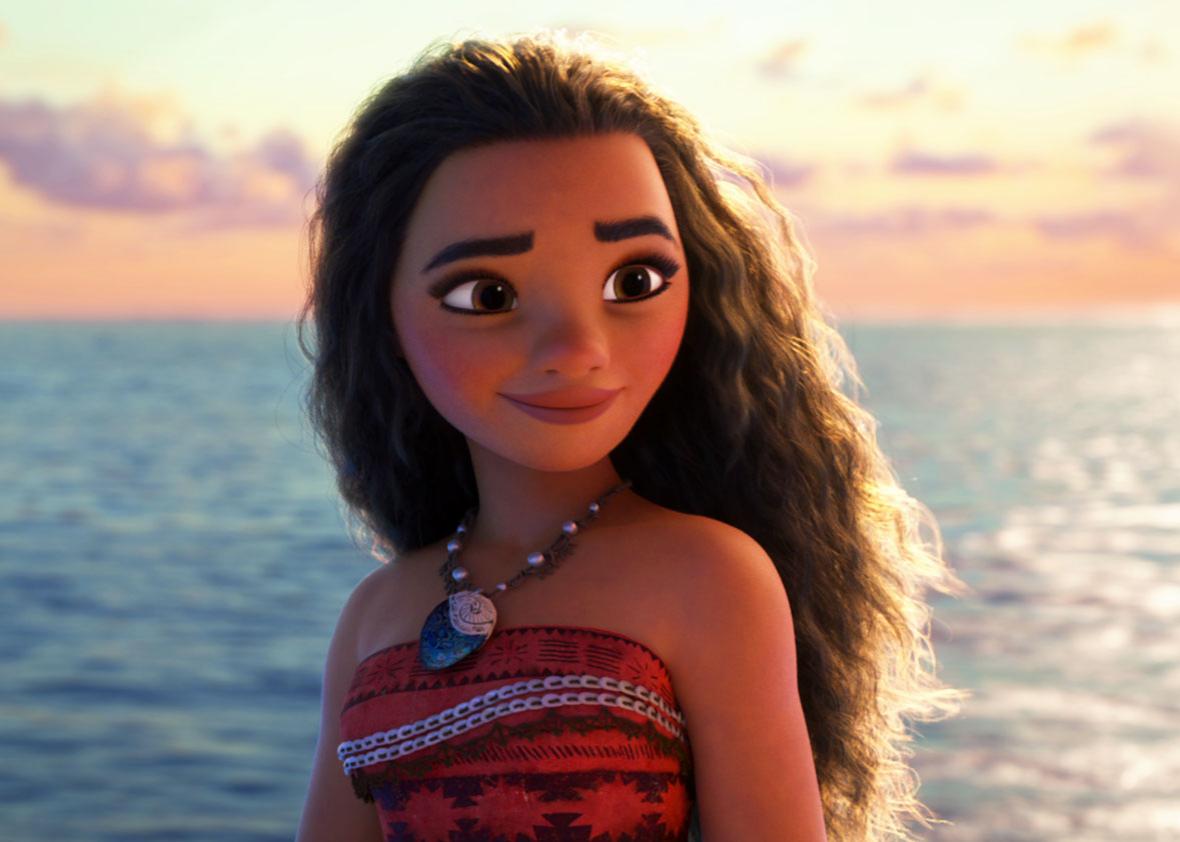You’ll hear a lot over the next few days about how much Moana, Disney’s new South Seas–set musical adventure, resembles the company’s classic The Little Mermaid. There’s the nautical theme, of course, and the singing crab, and the heroine with an intimate connection to the sea. And Moana counts among its four co-directors two Disney lifers who made their first impact with Mermaid back in 1989, John Musker and Ron Clements. (Also credited are Big Hero 6’s Don Hall and Chris Williams.) As Disney Animation Studios embarks on a third golden age of animated classics, Musker and Clements are among the company’s final connections to the company’s second one.
But walking out of the rousing Moana with my exuberant kids, I found myself thinking not of the touching and timeless Mermaid but rather of another Musker-Clements film of that era, Aladdin. Like Aladdin, Moana sees Disney broadening its worldview to sample the myths and musical traditions of a whole new world, in this case Polynesian and Pacific Islander culture. And just like boring Aladdin himself, Moana’s dull titular hero is overshadowed by a shape-shifting trickster played by a big, charismatic star. Kids, meet your generation’s Genie: Maui, the demigod voiced by Dwayne Johnson (née “the Rock”), whose appearance in the film’s second act transforms Moana from dutiful (if beautiful) Disney adventure-by-numbers to something wilder, funnier, and way more entertaining.
And really, really likable. Musker and Clements and Hall and Williams and the rest of the movie’s army of co-writers (which includes the New Zealand writer-director Taika Waititi) deserve credit. So does Lin-Manuel Miranda, whose first new songs since Hamilton—co-written with longtime Disney composer Mark Mancina (The Lion King, Tarzan) and the Samoan-born bandleader Opetaia Foa’i—pepper the film and sometimes even have the energy to break through the accumulated cruft of decades of Disney boilerplate. And the movie’s portrayal of its Polynesian setting is much more reverent than Aladdin’s “It’s barbaric, but hey, it’s home!” take on the Middle East. (I suspect the film will be embraced by viewers of Pacific Islands origin, starved for any portrayals of their heritage in pop culture.) If its heroine, despite her spunkiness, is a little milquetoasty, at least she doesn’t pine for a guy—though how dumb is it that in 2016 we still have to compliment a kids’ movie for that?
Moana (voiced by Hawaiian teenager Auli’i Cravalho), daughter of the chief of the island of Motunui, has always felt the pull of the sea. But her father forbids any islander to sail outside the reef, and he implores his daughter to focus on home and the local people who look to her to lead. Needless to say, soon Moana is out on the open ocean in a traditional Polynesian outrigger canoe, searching for the only demigod who can save her island.
Though the film’s evocation of paradise is gorgeous, its first act is a snooze; it’s only when Moana finds finds Maui that the movie kicks into gear. In part that’s thanks to Johnson’s broad, enthusiastic vocal work, which makes good use of the affability that underlies his performative cockiness. But it’s also thanks to Maui’s clever character design; enormous and muscled, his fully tattooed torso serves a kind of canvas for animated storytelling. Johnson’s showcase song, “You’re Welcome,” tells the same story told in Hawaiian singer Israel Kamakawiwo’ole’s hit “Maui Hawaiian Sup’pa Man”—Maui and his magical fishhook pulled the islands from the sea, gave humans the gift of fire, and generally served as both creator and troublemaker—but adds a welcome dose of foolishness. Some of Moana’s best visual gags come courtesy of Maui’s failed attempts to regain that magic, as when he disgustedly realizes he’s transformed into a half-god–half-shark.
“You’re Welcome” isn’t Moana’s musical high point; that would be “Shiny,” a wild villain number sung by Flight of the Conchords’ Jemaine Clement as a monster crab with a thing for jewelry. Most of the musical’s other songs, though they’ll surely be mainstays on Radio Disney, fail to break through—despite the occasional lively Mirandian couplet, they’re just doing too much expository work in the voices of too many bland characters. Shoehorning his wordplay into the Disney mold, the movie underutilizes the sardonic humor and subtle heart that make Miranda’s music special; instead, it encourages his most obvious instincts, so songs like “How Far I’ll Go” are far more reminiscent of the blunt, subtext-free “It’s Quiet Uptown” than they are of his best work.
So what’s great about Moana besides the great big demigod? The way it incorporates and dramatizes the legitimately amazing true story of ancient Polynesian navigation and exploration, for starters. The remarkably stupid chicken who accompanies Moana on her adventure. The movie’s determination to make its heroine earn her happy ending. Its casual denigration of princesses. And its move away from the big-eyed, small-mouthed, and stick-thin character design that’s taken over feature animation to give its women realistic faces and bodies. (No surprise that it’s the best Disney movie on this front since the last one to center on Pacific Islanders, Lilo and Stitch.)
And its ending. I won’t give it away, other than to say that the movie takes an imaginative leap in its final five minutes that also allows its animators to create one of the most remarkable transformations I’ve ever seen on a movie screen, a flowering of beauty and life worthy of Hayao Miyazaki. It sent my kids out of the theater delirious with glee and will likely do the same to yours. Such is the quality of Disney animation in the John Lasseter era that even a good-but-not-great movie like this can feature moments that take your breath away. The rest? Like Aladdin, Moana will be adored by few but liked by all. That a princess movie filled with brown faces and absent a love interest will be a slumber-party staple for decades may be its most important legacy.
